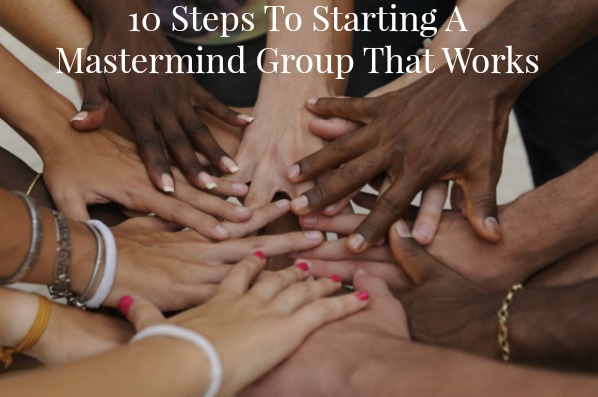I have been a part of at least one Mastermind group, sometimes more than one at a time, for several years. I have participated in virtual and in-person Mastermind groups. There are major differences between the two, but that’s for another post. This post shares how to start and manage a virtual Mastermind group, because its likely that you already have at least one virtual connection who you think would make a good Mastermind partner. There are also different types of Mastermind groups. This post discusses business Mastermind groups, but many of the principles I share would be useful to help you establish any type of Mastermind group.

Before I get to the 10 steps, I’ll first tell you what business Masterminding is and what it has meant to my business. A Mastermind group is a group of two or more similarly situated, like-minded people who gather regularly to address and solve their biggest business challenges. It’s different from coaching because there is no “coach.” In a Mastermind group, everyone is both coach and client.
This is what I like most about Masterminding. Everyone has areas of expertise based on their business, but no one is considered the “expert” in the group. The energy that embraces me when I am surrounded by my powerful, forward-looking, results-oriented Mastermind partners is indescribable. When I walk into the room (or get on the phone) with them, I cannot help but bring my own A game. Being challenged to bring that game with me month after month, year after year, in my business propels me forward in and of itself. After a good Mastermind session, I feel encouraged and empowered to soldier on — even if I’m having a lousy week. Here are 10 steps to starting a Mastermind group that works.
-
Create a statement of purpose
Your “why” is critically important because it helps you be intentional and stay on track. You’ll want to think this through and create a statement that fully reflects the purpose for your group. Don’t skip this step because it will help you gain clarity about why you want to Mastermind and what you hope to get out of it. Your statement of purpose should clearly summarize what the purpose of your group is and what its priorities are. If your group is for women, it should be made clear here. If your group is for people at a certain income level, it should be made clear here.
Here is a version of a mission statement I have previously used in a Mastermind group:
The XYZ Mastermind Group is a group of proactive entrepreneurs who meet monthly to brainstorm and problem solve, create and share collaborative opportunities, increase our collective profitability, and positively impact and shape our local community.
In hindsight, even this is too broad, but you get the idea. As you can see, this group was for entrepreneurs only, and a main focus was to increase profitability. We also thought it was important to be a positive influence in our local community. Your statement of purpose may have some of the same elements, or it may be entirely different. It’s up to you, but drawing up your statement in advance will give you the ability to more clearly decide who to approach to be a part of your group. It will also make it easier for prospective Mastermind partners to quickly see whether they can get on board with the purpose you have laid out.
-
Establish rules of engagement
You may want to resist doing this, but don’t. If your Mastermind is designed to help everyone involved get results, and if the idea is that people will be committed to the group, then you will need some basic rules. A few to consider: (1) be on time for each meeting; (2) be prepared for each meeting; (3) keep confidences; (4) the proper process for exiting the Mastermind group for those who don’t want to participate any more; and (5) the proper process for asking people to resign for violation of any of the Mastermind rules.
A Mastermind only works if everyone brings their best to each meeting. Once a Mastermind gets going, people rightly rely on each other for positive flow and momentum. It’s very disruptive when someone continuously misses meetings, arrives late or unprepared, etc. But life happens, and I have learned from experience that it’s best to set out how issues will be handled *before* they happen. (And they will happen …)
As you become more involved in Masterminding, you’ll be continually tweaking your rules of engagement. At some point, you may even want to require a financial commitment. There’s nothing like putting your money where your mouth is to encourage commitment and accountability.
-
Choose Mastermind partners carefully
Don’t ask just anyone to be your Mastermind partner. If you’re new to Masterminding, it’s best to start with just one other person and grow from there. Choose wisely though. Just because someone is your friend, does not mean they will make a good Mastermind partner.
Four of the top characteristics of a good Mastermind partner are: (1) she is willing to be held accountable to you (the group) and to her own commitments; (2) she is at about the same level of business growth and income as you are; (3) she understands that authenticity and transparency are two of the foundations of a successful Mastermind group; and (4) she has the experience and “chops” to bring something of value to the table every time you meet. If a person is missing any one of these characteristics (or if you are), she will not be a good Mastermind partner.
Don’t surround yourself with Mastermind partners who will smile and agree with everything you say. Don’t surround yourself with Mastermind partners who will let you off the hook for dropping goals you set for yourself. You will only grow if you challenge yourself. You should therefore surround yourself with people who will challenge you as they challenge themselves. You want people who can hit the ball back to you, and hit it hard. Drop shots and lobs are too easy to hit back. Surround yourself with people who mean business — who hit back hard, and mean it.
-
Decide when you will meet
I have found that monthly Mastermind meetings are the *absolute* minimum for effective results. For virtual Masterminds, I prefer once a week because the frequency helps compensate for the fact that it’s virtual.
My in-person Mastermind meets in person monthly, but we have opportunities for telephone Masterminding for anyone who feels the need for more frequent accountability. (I almost always take advantage of this!) When people embrace the forward motion this provides, great things happen. Each individual achievement serves to drive the overall progress of everyone in the group. When others report their success regularly, you are more likely to have more success too. I encourage you to consider “in between meetings” like this if you only meet once a month.
Whether it’s monthly, bi-monthly, or weekly, make the time specific and stick to it. If you have a virtual Mastermind, you can meet via Skype — though my personal preference is using the humble telephone. It works and you don’t have to worry about bed head.
-
Create an agenda and keep time
Next, nail down on your Mastermind agenda. Here’s a basic flow that I have used in a bi-weekly 2-person, hour-long Mastermind meeting arrangement. Each person gets 20 minutes, and 10 minutes are used for feedback. The 20 minutes can be used in one of two ways: (1) reporting progress made on some project that you have reported on previously; or (2) reporting on a particular and specific problem or challenge you are facing.
Use a timer to track the 20 minutes, and then use five minutes for feedback and suggestions. The total time used is 50 minutes, leaving 10 minutes for housekeeping matters that always come up during Mastermind meetings. Obviously, you will increase the times proportionately if you have more than two people in your group.
Housekeeping matters are things like vacation announcements requiring the need to change future meeting dates, the periodic need to review or edit your statement of purpose, etc. There is *always* something. Create an agenda and then tweak it as you go to reveal what works for your group, but remember the idea is that there should be flow from one week to another so people can stay on track, engaged, and accountable to their goals and project undertakings.
-
Take notes
Masterminding makes it easy for you to track progress on projects you are working on. You can easily alternate who takes and distributes notes. After several months of Masterminding, it’s great to celebrate everyone’s progress toward specific goals. It’s also interesting to see your own work and commitment patterns in a more objective fashion. You’ll be happy to discover some things you do well and others where you can improve.
A secret Facebook group is an easy and effective way to maintain notes, post meeting dates and times, and keep up with Mastermind partners between meetings.
-
Require honesty
This may seem obvious, but in practice, it’s not. Masterminds work because people are transparent and authentic with their challenges and struggles. Don’t shortchange yourself by holding back, and don’t allow others to do so either.
Entrepreneurship is hard, and Masterminding with people who pretend they have it all together is a waste of time and energy. Make sure confidentiality is a part of your group (put it in writing) and insist that everyone bring their most authentic selves to each meeting.
-
Have the hard discussions
As your Mastermind group progresses, there will be times when not everyone agrees on how to handle something. This is why it’s so important to have clear core principles and rules of engagement. When you have a clear and objective document to look to, it’s an easier and less confrontational process to resolve difficult situations. If (and really, when) a situation arises that you did not anticipate, everyone has to do their best to work out a solution, and then add it to the working rules document so there are objective criteria in place to handle the situation when it happens again.
-
Invite a special guest from time to time
If you collect Mastermind group dues, you can put some of the money toward a special speaker now and then. This is a nice idea to help break up the monotony and to inject some new ideas into the group. This is a nice event for virtual and physical Mastermind groups.
-
Tweak as you go
Like you and your Mastermind partners, your Masterming group is a living, breathing organism. It will change and grow over time, so you must give it permission to do that. Be firm in your mission and rules, but not so firm that things cannot be changed by a vote of the majority of people involved.
Best and success,
![]()
Top



